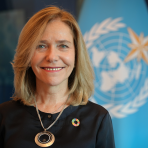Statement at the High-level meeting "Baku Dialogue on Water for Climate Action"
His Excellency Mukhtar Babayev,
His Excellency Andre Correa do Lago,
His Excellency Abdulla Ahmed Balalaa
Excellencies, colleagues,
It is an honour and pleasure to be here today together with the COP28, COP29 and COP30 Presidencies.
The Baku Dialogue on Water for Climate Action is vital to provide continuity between the annual UN climate negotiations and promote coherence and collaboration.
Water management must be integrated into all aspects of the global climate and sustainable development agenda.
Let me ask you a question: How can you manage a dam, a flood, or a hydroelectric plant if you have no information or data.
The answer: You can’t. You are blind to the risks to lives, livelihoods and economies.
This is why the World Meteorological Organization’s always insists that we cannot manage what we do not measure. And this applies to both climate and to water.
Data - and data sharing - is more important today than ever. And to achieve this we need better water data and information systems.
The cost of investment may seem high. But it is – literally - a drop in the ocean compared to the costs of a flooding event, of a long-lasting drought, or of the construction of a new dam.
Excellencies, friends,
The WMO’s recent report on the state of global water resources shows that the water cycle is becoming more unpredictable. Too much or too little – and at the wrong time or in the wrong place.
This has a cascading impact on economies and ecosystems, on key sectors like agriculture and energy, and – of course on public health and safety. This is why WMO’s top initiative – Early Warnings for All – places such priority on water.
We now face the challenge of managing not just rivers on the ground – but atmospheric rivers in the sky. How can we do that? Even as a scientist, I have no ready answer.
And what about the water towers of the world? Our iconic glaciers which are retreating, and which bring so many short-term hazards and threaten so much long-time water insecurity.
There are many challenges. And to tackle them we need integrated water and climate approaches – from observing systems, to predictive models to policy support.
At the same time, we must also be aware of the opportunities.
For instance, we are experiencing the potential of Artificial Intelligence. AI is already supporting hydrological work across the value cycle — from monitoring to data management to modeling and forecasting.
But guess what: AI needs data!
This is why WMO is strengthening its support to its Members and partners to develop a trusted, sustainable hydrological information infrastructure as part of our Earth System approach.
We are therefore happy to co-lead and contribute to the BAKU Dialogue on Water for Climate Action, especially on the work package dedicated to science-based support.
WMO has many important initiatives, including the Hydrological Status and Outlook System, which will provide information and forecasts at global, regional and basin level.
WMO’s World Water Data Initiative aims at improving data collection and sharing.
Throughout WMO’s 75 years as a specialized UN agency, we have championed data diplomacy and data sharing based on collaboration and trust. When it comes to water data, there is much room for improvement.
Excellencies, colleagues,
The World Meteorological Organization stands ready to work with all partners to turn dialogue into data, and data into action.
We must intensify our scientific collaboration to better understand how a changing climate is reshaping the world’s water systems — from melting glaciers to drying rivers, from floods to droughts.
Evidence-based policy must guide every step we take.
Let us recommit to the Baku Dialogue — to enhance climate action for water. Our planet and our children depend on it.
Thank you.
Statement by


